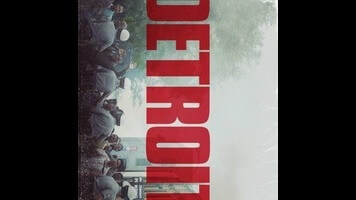Most of Detroit is set on the fateful night of July 25-26, 1967, when the Algiers Motel was raided in search of a non-existent sniper. But it starts earlier, first with an animated sequence that recounts the Great Migration and the disenfranchisement of black inner cities, and then with the July 23, 1967 police raid on a late-night party celebrating the return of two black soldiers from Vietnam that set off five days of rioting and looting in Detroit. We are introduced to a large number of characters: Larry Reed (Algee Smith), a member of the Stax Records vocal combo The Dramatics, who ends up at the Algiers with his buddy Fred Temple (Jacob Latimore) after a gig with Motown’s Martha & The Vandellas (heard performing “Nowhere To Run,” of course) is stopped midway through because of the rioting; Dismukes, who is guarding a nearby grocery store from looters; the composite character of Krauss (Will Poulter), the dead-eyed young patrolman who will lead the interrogation; Carl Cooper (Jason Mitchell), whose drunken prank with a starter pistol will lead a band of state and city cops and National Guardsmen to the motel; and out-of-towners Juli Hysell (Hannah Murray) and Karen Malloy (Kaitlyn Dever), the motel’s only white guests, caught playing cards with Vietnam vet Robert Greene (Anthony Mackie), a long-term resident of the Algiers who has come to Detroit in search of work.
Earlier in her career, Bigelow’s movies were distinguished by their robust camera style, but here she reunites with her Hurt Locker director of photography, Barry Ackroyd, who specializes in making movies look like they couldn’t afford the services of a professional cinematographer; his impatient style is half vérité mockumentary, half grandma’s camcorder. It looks flat and ugly in spots, but the subject is ugly, too. Still, one can’t help but think what the Bigelow of old (or, barring that, the more dramatic lensing of Greig Fraser, Zero Dark Thirty’s cinematographer) could have made of Detroit’s long, queasy centerpiece, in which Krauss and two other white cops torture the guests as Dismukes and a semi-sympathetic National Guard officer (Austin Hébert) look on. Because Detroit isn’t some kind of nobly middle-brow social-issue turkey; it’s a very angry movie packed with ideas about the difference (or lack thereof) between racist threats and racist violence and the militarization of American policing, drawing the Vietnam War, the racism of law enforcement, and this country’s later forays into the Middle East into a continuum. There is even a reason to admire its dawdling moments: Among all the movies that wallow in the horrors of violence against America’s black citizenry, there are few that devote this much time to grief.
Bigelow is an outlier among the American filmmakers of her generation, not because she’s a woman who mostly makes movies about men, but because she has a serious background in semiotics-focused, theory-intensive, deconstructionist 1970s film and arts studies—the action director who rehabbed lofts with Philip Glass while studying under Susan Sontag. Her films always seem reluctant to self-articulate or admit their own smarts, as though it would dispel the thrill of the text. Thus, they leave themselves open to misinterpretation. (See: Zero Dark Thirty, probably the bleakest fiction film made to date about the War On Terror.) Awkwardly congested with clips of archival documentary footage and references to the tenor of the times, Detroit is impossible to read as anything but a condemnation—albeit one that refuses to voice an opinion on Dismukes, except to suggest that part of the insidiousness of institutionalized racism is the way it makes anyone who doesn’t stand up against it into a co-conspirator. And yet it comes across as incomplete, its metaphors, bit characters, traumas, and tacked-on subplots never threading together into a larger canvas—a “big picture” movie where only the most tightly cornered, claustrophobic moments seem finished.






















![Rob Reiner's son booked for murder amid homicide investigation [Updated]](https://img.pastemagazine.com/wp-content/avuploads/2025/12/15131025/MixCollage-15-Dec-2025-01-10-PM-9121.jpg)


















